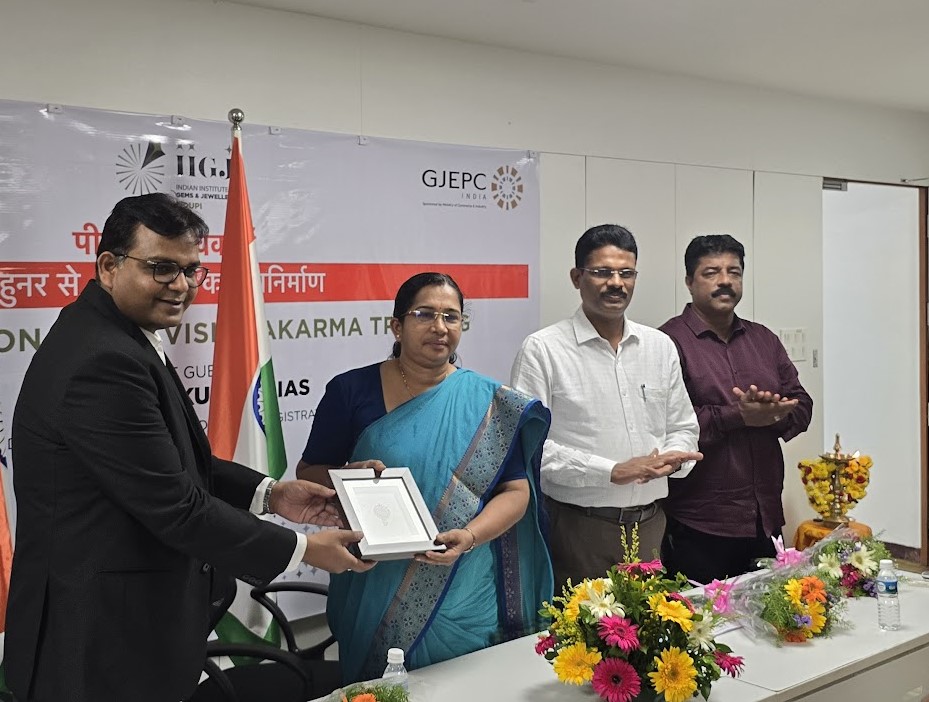
Mumbai: India’s Gem & Jewellery Export Promotion Council (GJEPC) launched the PM Vishwakarma Training Program at Indian Institute of Gem & Jewellery (IIGJ), Udupi (Mangalore, Karnataka) in an endeavour to empower the artisans of the gem and jewellery industry and enhancing their skills and productivity.
Participants of the program will receive a toolkit valued at ₹15,000 from the Government of India, along with a daily stipend of ₹500 for the seven-day training period.
The inaugural ceremony of the first batch training program at IIGJ Udupi was presided over by Dr. K. Vidya Kumari, IAS, Deputy Commissioner & District Magistrate of Udupi District. The event saw the presence of dignitaries including Mr. Nagaraj Nayak, Joint Director of the District Industries Centre; Mr. Pradeep D’Souza, District Skill Development Officer; Mr. Siddartha H., COO of GJEPC; and Mr. Debasish Biswas, CEO of IIGJ.
Mr. Vipul Shah, Chairman, GJEPC, said, “Artisans and craftsmen are the heart and soul of the ‘Make in India for the world’ gem & jewellery industry. The PM Vishwakarma Program aims to empower and enhance the traditional skills of such Vishwakarma artisans in the gem & jewellery business. It provides them with opportunities for skill enhancement and access to modern tools. IIGJ Udupi is set to train over 500 PM Vishwakarma trainees in upcoming batches, with each batch comprising 30-40 candidates.”
With a financial outlay of Rs. 13,000 crore for a period of five years, the scheme will benefit about 30 lakh families of traditional artisans and craftsmen, including weavers, goldsmiths, blacksmiths, laundry workers, and barbers. In September 2023, Prime Minister Narendra Modi launched the ’PM Vishwakarma’ scheme on the occasion of ’Vishwakarma Jayanti’, under which traditional craftsmen and artisans will be provided loan assistance at a minimal interest rate without the need for collateral.
The scheme also offers financial support through collateral-free credit, interest subvention, and incentives for digital transactions. Additionally, it seeks to provide a platform for brand promotion and market linkages, fostering growth and development in the sector.
BENEFITS TO THE ARTISANS AND CRAFTS PERSONS
The Scheme envisages provisioning of the following benefits to the artisans and crafts persons:
Recognition: Recognition of artisans and craftspeople through PM Vishwakarma certificate and ID card.
Skill Upgradation: Basic Training of 5-7 days and Advanced Training of 15 days or more, with a stipend of Rs. 500 per day.
Toolkit Incentive: A toolkit incentive of up to Rs. 15,000 in the form of e-vouchers at the beginning of Basic Skill Training.
Credit Support: Collateral free ‘Enterprise Development Loans’ of up to Rs. 3 lakh in two tranches of Rs. 1 lakh and Rs. 2 lakh with tenures of 18 months and 30 months, respectively, at a concessional rate of interest fixed at 5%, with Government of India subvention to the extent of 8%. Beneficiaries who have completed Basic Training will be eligible to avail the first tranche of credit support of up to Rs. 1 lakh. The second loan tranche will be available to beneficiaries who have availed the 1st tranche and maintained a standard loan account and have adopted digital transactions in their business or have undergone Advanced Training.
Incentive for Digital Transaction: An amount of Re. 1 per digital transaction, up to maximum 100 transactions monthly will be credited to the beneficiary’s account for each digital pay-out or receipt.
Marketing Support: Marketing support will be provided to the artisans and craftspeople in the form of quality certification, branding, onboarding on e-commerce platforms such as GeM, advertising, publicity and other marketing activities to improve linkage to value chain.
In addition to the above-mentioned benefits, the Scheme will onboard the beneficiaries on Udyam Assist Platform as ‘entrepreneurs’ in the formal MSME ecosystem. Enrolment of beneficiaries shall be done through Common Service Centres with Aadhaar-based biometric authentication on PM Vishwakarma portal. The enrolment of beneficiaries will be followed by a three-step verification which will include Verification at Gram Panchayat/ ULB level, Vetting and Recommendation by the District Implementation Committee and Approval by the Screening Committee.



